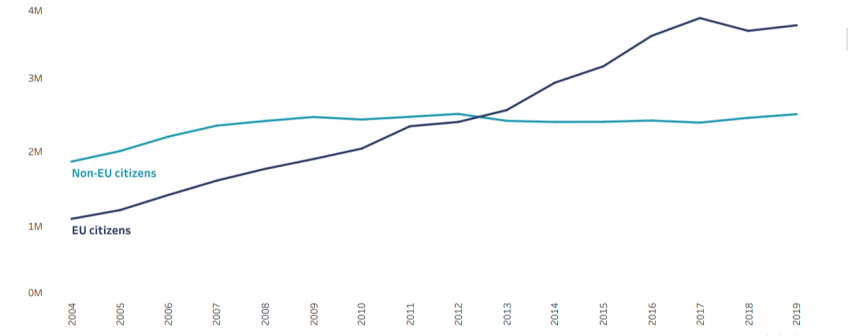Free movement between the UK and the EU will end on 31 December 2020, and EU and non-EU citizens will be treated equally, meaning people from EU countries wanting to work in the UK will have to jump through a lot more hoops than before. With the EU-born population in the UK making up 38% of the migrant population in 2019, it is clear that this will have huge consequences both for those already living in the UK and those who wish to do so in the future. Irish citizens are exempt from these new rules.

EU citizens already living in the UK by 31 December do not have to go through the new system, but instead can apply to the EU Settlement Scheme until June 30 2021. If they are successful, they will be able to remain in the UK and claim the same benefits as UK citizens if they become unemployed.
The tone of the majority of conversations surrounding the UK’s new immigration laws has been negative, as experts have discussed the detrimental effect on the UK’s economy as well as the decrease in opportunities for migrants who currently live in the UK as well as those who were hoping to work and study in the United Kingdom.
Employment Rights
Under the new rules, EU workers would be required to apply for a visa to work in the UK. They will have to gain ‘points’, and once they reach 70 points, they can work in the UK. These points are gained by certain skills and qualifications, for example being able to speak English equates to 10 points and getting a job offer with a salary meeting a minimum threshold of £20,480 is 20 points.
This means so-called “low-skilled workers” (the Home Office received a great deal of criticism for using this term to describe people who would not make the salary requirement, even though this bracket includes care workers and some nurses - both professions are lacking numbers in the UK) would struggle to gain any right to work in the UK. Their only option is to apply for short term visas such as ‘youth mobility’ or ‘seasonal agriculture’ programmes.
This system could make it much easier to exploit migrants by offering them insecure zero-hour contracts. Immigrant workers may be less motivated to report bad employers or leave their job to avoid losing their immigration status, while undocumented workers will have almost no employment rights.
Additionally, the UK Home Office has admitted that its new visa rules may discriminate against people with disabilities, as part of the new Tier 2 so-called immigrants will be prohibited from accessing public funds and state benefits, such as housing benefit until they obtain UK settlement. The government agency said: “Disabled people who rely on public funding to support their daily living may not be able to make use of some or all of the UK immigration routes.”
To ensure migrant workers are safe, employers will need to encourage any employees to apply for British citizenship. This only applies to workers who have been in the UK for at least three years with EU settled or Indefinite Leave to Remain Status.
Workforce Shortages
The new rules will prevent UK business owners from hiring EU workers without becoming a licensed sponsor. This will affect many companies but also large public organisations, especially the NHS (National Health Service), which is already facing a massive shortage of medical staff during this current crisis, with more staff quitting or taking time off for stress and illness.
The Migration Advisory Committee has advised the government to add nursing auxiliaries and assistants to the UK’s shortage occupation list. There has also been a recent review of the list which states a significant shortage of butchers, welders and bricklayers as well as many other occupations.
The government has introduced a campaign to help businesses throughout the UK prepare before the changes come into effect. This includes introducing schemes for scientists, academics, investors, entrepreneurs and more. However, they fail to include so-called “low-skilled workers”. This is why there are now employment experts on hand to offer advice to help available companies stay in line with the new rules.
Student Population Decrease
Introducing a points-based system inevitably affects universities, as there will be fewer international students. Currently, international students make up 19.6% of the student population in the UK, with this figure rising to 35.8% for postgraduate degrees. This will not only impact universities but will also have a detrimental effect on the economy.
Once the points-system comes into effect, overseas students from the EU must apply for a student visa and to be eligible they must meet the seventy point requirement. This includes fifty points for confirmation of acceptance for studies, which must be provided in the form of a letter or email from the chosen University. Ten points are also required for financial means which involves providing evidence to show that students can afford tuition, accommodation and maintenance fees. A further ten points are awarded for English language proficiency, which is a requirement for any students coming from non-English speaking countries who must meet the level of B2 on the Common European Framework to qualify.
While these downsides may be detrimental to businesses across the UK, there are also plenty of organisations working to update companies on the new rules, including immigration solicitors.
The Impact on the EU
Just like EU citizens who currently live in the UK, British citizens who are living in the EU will need to apply for residence status in the country they are residing in by 30 June 2021. However, on 28 September 2020, the EU confirmed that some member states may extend this as a result of the pandemic. The exact conditions for settlement vary between EU countries, and it is the responsibility of each member state to set up a settlement scheme. People from EU countries can travel to the UK without a visa, so the EU has added the UK to the list of 61 visa-exempt countries to allow travel between the EU and UK with relative ease, providing the stay is less than 90 days.
The automatic right for UK residents to live and work in the EU ceases after the transition period. After this, citizens must apply in accordance with the immigration rules, depending on the country they are moving to. People who want to work in the EU after the transition period will have to ensure that their qualifications are recognised in the EU.
While travelling between the UK and EU remains relatively unchanged, the new points-based system has introduced a number of grey areas and difficulties in terms of employment for EU citizens in the UK and vice versa, making the loss of free-movement yet another dismal consequence of Brexit.

Follow the comments: |
|
